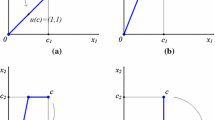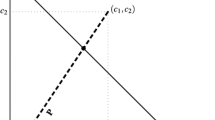Abstract
This paper reports an experimental study on three well-known solutions for problems of adjudicating conflicting claims: the constrained equal awards, the proportional, and the constrained equal losses rules. We first let subjects play three games designed such that the unique equilibrium allocation coincides with the recommendation of one of these three rules. In addition, we let subjects play an additional game that has the property that all (and only) strategy profiles in which players coordinate on the same rule constitute a strict Nash equilibrium. While in the first three games subjects’ play easily converges to the unique equilibrium rule, in the last game the proportional rule overwhelmingly prevails as a coordination device, especially when we frame the game as an hypothetical bankruptcy situation. We also administered a questionnaire to a different group of students, asking them to act as impartial arbitrators to solve (among others) the same problems played in the lab. Also in this case, respondents were sensitive to the framing of the questions, but the proportional rule was selected by the vast majority of respondents.
Similar content being viewed by others
References
Aumann RJ, Maschler M (1985) Game theoretic analysis of a bankruptcy problem from the Talmud. J Econ Theory 36: 195–213
Ashenfelter O, Bloom DE (1984) Models of arbitrator behavior: theory and evidence. Am Econ Rev 74: 111–124
Ashenfelter O, Currie J, Farber HS, Spiegel M (1992) An experimental comparison of dispute rates in alternative arbitration systems. Econometrica 60: 1407–1433
Bar-Hillel M, Yaari M (1993) Judgments of distributive justice. In: Mellers B, Baron J (eds) Psychological perspectives on justice: theory and applications. Cambridge University Press, New York
Binmore K, Osborne M, Rubinstein A (1992) Noncooperative models of bargaining. In: Aumann R, Hart S (eds) Handbook of game theory I. North-Holland, Amsterdam
Binmore K (1998) Game theory and the social contract, vol II: Just playing. MIT Press, Cambridge
Bosmans K, Schokkaert E (2007) Equality preference in the claims problem: a questionnaire study of cuts in earnings and pensions. CORE Discussion Paper 2007/30
Cuadras-Morató X, Pinto-Prades JL, Abellán-Perpiñán JM (2001) Equity considerations in health care: the relevance of claims. Health Econ 10: 187–205
Chun Y (1989) A noncooperative justification for egalitarian surplus sharing. Math Soc Sci 17: 245–261
Costa-Gomes M, Crawford V, Broseta B (2001) Cognition and behavior in normal-form games: an experimental study. Econometrica 69: 1193–1235
Dagan N, Serrano R, Volij O (1997) A Noncooperative view of consistent bankruptcy rules. Games Econ Behav 18: 55–72
Fehr E, Schmidt KM (1999) A theory of fairness, competition and cooperation. Q J Econ 114: 817–868
Fischbacher U (2007) z-Tree: zurich toolbox for ready-made economic experiments. Exp Econ 10(2): 171–178
Frolich N, Oppenheimer JA, Eavey CL (1987) Choices of principles of distributive justice in experimental groups. Am J Polit Sci 31: 606–636
Gächter S, Riedl A (2006) Dividing justly in bargaining problems with claims: normative judgements and actual negotiations. Soc Choice Welf 27: 571–594
Gauthier D (1986) Morals by agreement. Clarendon Press, Oxford
Ju B-G, Miyagawa E, Sakai T (2007) Non-Manipulable division rules in claim problems and generalizations. J Econ Theory 132: 1–26
Ju B-G, Moreno-Ternero JD (2008) On the equivalence between progressive taxation and inequality reduction. Soc Choice Welf 30(4): 561–569
Hart O (1999) Different approaches to bankruptcy, in governance, equity and global markets. In: Proceedings of the annual bank conference on development economics in Europe June 21–23
Herrero C (2003) Equal awards versus equal losses: duality in bankruptcy. In: Sertel MR, Koray S (eds) Advances in economic design. Springer, Berlin, pp 413–426
Herrero C, Villar A (2001) The three musketeers: four classical solutions to bankruptcy problems. Math Soc Sci 42: 307–328
Herrero C, Moreno-Ternero JD, Ponti G (2003) An experiment on bankruptcy. IVIE Discussion Paper WP-AD 2003-03
Kaminski M (2006) Parametric rationing methods. Games Econ Behav 54: 115–133
Moreno-Ternero JD (2002) Noncooperative support for the proportional rule in bankruptcy problems. Universidad de Alicante, Mimeo
Moulin H (2000) Priority rules and other asymmetric rationing methods. Econometrica 68: 643–684
Moulin H (2002) Axiomatic cost and surplus sharing. In: Arrow KJ, Sen AK, Suzumura K (eds) Handbook of social choice and welfare, vol I. Elsevier Science B.V, Amsterdam
Nash J (1953) Two-person cooperative games. Econometrica 21: 128–140
O’Neill B (1982) A problem of rights arbitration from the Talmud. Math Soc Sci 2: 345–371
Ochs J, Roth A (1989) An experimental study of sequential bargaining. Am Econ Rev 79: 355–384
Roemer JE (1996) Theories of distributive justice. Harvard University Press, Cambridge
Skyrms B (1996) Evolution of the social contract. Cambridge University Press, Cambridge
Sugden R (1986) The Economics of rights, cooperation and welfare. Basil Blackwell, Inc, Oxford
Thomson W (2003) Axiomatic and game-theoretic analysis of bankruptcy and taxation problems: a survey. Math Soc Sci 45: 249–297
Yaari ME, Bar-Hillel M (1984) On dividing justly. Soc Choice Welf 1: 1–24
Author information
Authors and Affiliations
Corresponding author
Additional information
Financial support from the Spanish Ministry of Science (BEC2001-0980, BEC2001-0535, CSD2006-16, ECO2008-03883, SEJ2005-04805, SEJ2007-62656), MIUR (PRIN 2007MCKEYA), Generalitat Valenciana (GV06/275), Junta de Andalucía (P06-SEJ-01645, P08-SEJ-04154) and Instituto Valenciano de Investigaciones Económicas (IVIE) is gratefully acknowledged.
An erratum to this article can be found at http://dx.doi.org/10.1007/s00355-009-0406-4
Rights and permissions
About this article
Cite this article
Herrero, C., Moreno-Ternero, J.D. & Ponti, G. On the adjudication of conflicting claims: an experimental study. Soc Choice Welf 34, 145–179 (2010). https://doi.org/10.1007/s00355-009-0398-0
Received:
Accepted:
Published:
Issue Date:
DOI: https://doi.org/10.1007/s00355-009-0398-0




